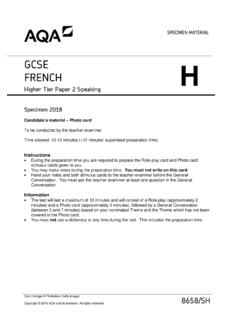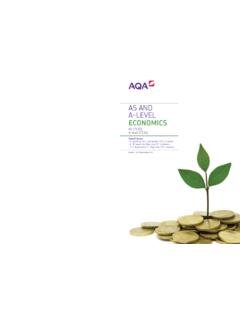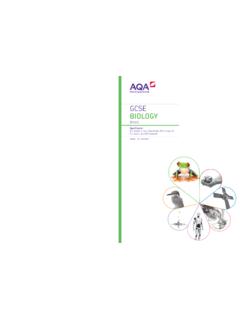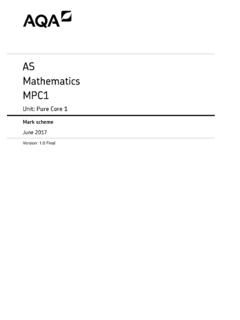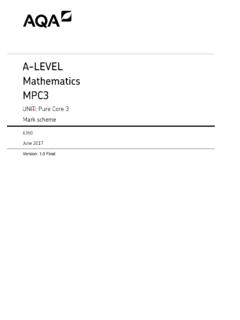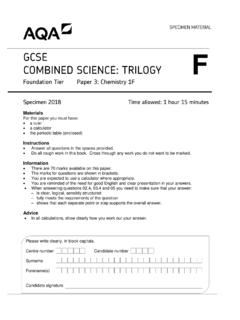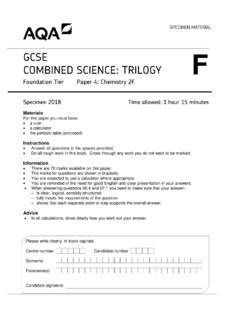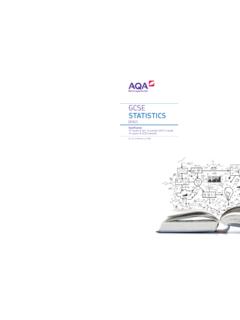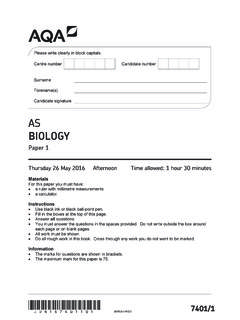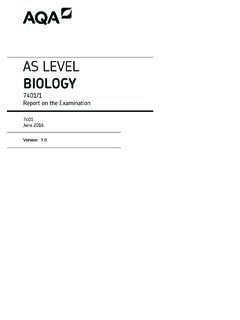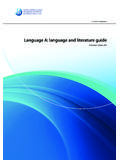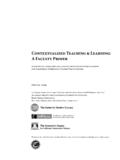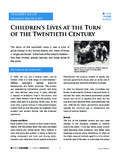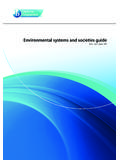Transcription of Speaking and writing - filestore.aqa.org.uk
1 Copyright 2014 AQA and its licensors. All rights reserved. AQA Education (AQA) is a registered charity (number 1073334) and a company limited by guarantee registered in England and Wales (number 3644723). Our registered address is AQA, Devas Street, Manchester M15 6EX. Controlled assessment handbook Speaking and writing GCSE French, German, Italian, Spanish and Urdu (autumn 2016 ) . This booklet must be read in conjunction with the relevant AQA GCSE Specification and the AQA GCSE Controlled Assessment Frequently Asked Questions Version , published autumn 2014.
2 This document has been updated to reflect the introduction of e-Submissions (e-Subs) system to submit marks electronically for 2016 onwards. Please make sure that you use this autumn 2016 version of the Handbook. Any subsequent changes to the Handbook will be published on our website and the version on the website will always be the most up to date version, although it may be different from printed versions. You can find further information about this and our other Languages qualifications at 3 Contents Pages Speaking 4 Task setting 4 Stage 2 6 Stage 3 8 Marking 10 Teacher online standardisation 11 writing 12 Task setting 12 Stages 1 and 2 14 Stage 3 16 Post results services 18 Appendices Appendix 1 Assessment criteria for Speaking 19 Appendix 2 Assessment criteria for writing 28 Appendix 3 Exemplar tasks 40 Appendix 4 Checklists for Speaking and writing 44 4 Unit 3 Speaking The Speaking unit is
3 Worth 30% of the qualification as a whole. There are 30 marks available per task, making a total of 60 marks. Each task should last between 4 and 6 minutes. students will complete two controlled assessment tasks. These tasks are untiered. Differentiation is by outcome, not by task. These tasks may be drawn from the exemplar tasks we provide or they may be adapted by the teacher for their students . Teachers may also devise their own tasks. Both tasks will be in the form of a dialogue. Schools/colleges must make a recording of one of the two tasks for each student.
4 The tasks will be marked by the teacher. The marks for both tasks and the recording for one of the tasks will be submitted to AQA for moderation. students must not submit the same task for Speaking and writing . The two Speaking tasks must be different from each other; at least one main bullet point and the unpredictable element must be different. The work of individual students may be informed by working with others but students must provide an individual response. Where model answers are published, students must not reproduce any sections of continuous prose provided in such answers.
5 Whilst students may use individual sentences from model answers, they must not reproduce several consecutive sentences from such answers in their own response. A student s response must not be identical to that of another student in the school/college or to any published model answer. Controlled Assessment Tasks See Appendix 3 for exemplar tasks. Task Setting Limited Control students are required to complete two tasks of equal weighting. Teachers may use the exemplar tasks provided by AQA, may use an adapted version of these exemplar tasks or may devise tasks which meet students individual learning needs or interests.
6 Adapting Exemplar Tasks Teachers may adapt the exemplars in the specification (see Appendix 3 of this Handbook) in the following ways. Exemplar A (i) - the task here is an interview. It could be adapted to be an interview with, for example, a teenager in another country, a business person or a celebrity. Please see Exemplar A (ii). Exemplar B (i) - the task here is a conversation. The exemplar is drawn from the context Leisure . It could be adapted to be a conversation drawn from a different context, eg a special occasion celebrated in the home from Home and Environment , or from a different aspect of the Leisure context, eg Holidays.
7 Please see Exemplar B (ii). It could, however, be drawn from outside the range of contexts listed in the specification. Tasks do not have to be approved by AQA, but Controlled Assessment Advisers are available to provide guidance to schools/colleges. Details of your adviser are available from the Languages team at Devising Tasks Teachers may choose to devise their own tasks. When devising their own tasks, teachers must ensure that students aiming to achieve grades C and above use a variety of structures which may relate to past and future events and express points of view, present information and show the ability to deal with some unpredictable elements.
8 For those students aiming to achieve grade A, teachers must ensure that tasks offer the opportunity to express and explain ideas and points of 5 view, to narrate events, producing extended sequences of speech and to use successfully a variety of verb tenses (ie two tenses). For students aiming to achieve grade F, teachers must ensure that tasks offer the opportunity to take part in simple conversations, present simple information and express opinions. Teacher-devised tasks do not need to be drawn from the range of contexts listed in the specification.
9 General Schools/colleges must submit different tasks every two years. This applies to the use of AQA exemplar tasks, adapted exemplar tasks and teacher-devised tasks. AQA will provide new tasks every two years. However, it is sufficient for schools/colleges to adapt the tasks by changing some of the bullet points in order to meet the requirement to submit different tasks. As a minimum, one main bullet point and the unpredictable questions must be different. It is not sufficient to change the unpredictable bullet point.
10 It is not necessary to change the task title. Teachers must ensure that for each individual student the tasks avoid duplication of the content of their writing task. A task submitted by one teacher can be submitted by another teacher in the same school/college two years later, for the same language or for a different language. If schools/colleges use the same task for a number of students , the unpredictable element must be changed. Depending on the number of students , 4-6 unpredictable bullet points should be prepared for each task.
